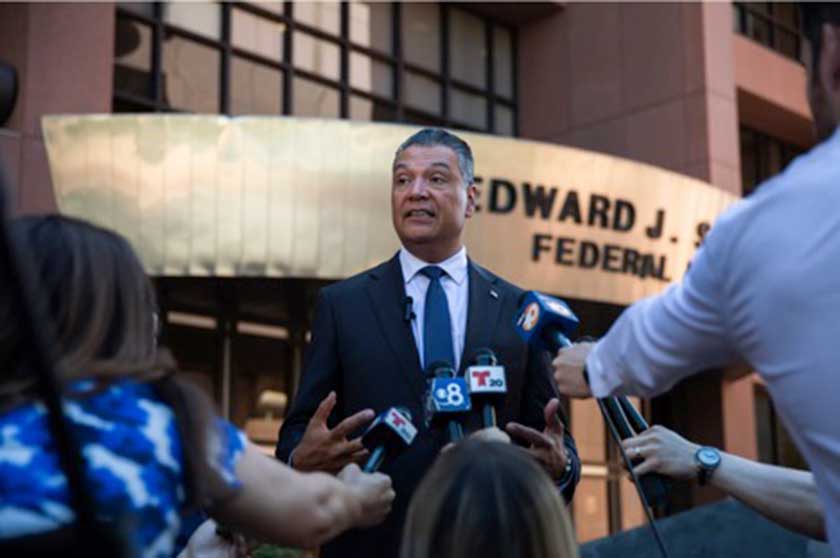By DEBORAH BRENNAN
When Sen. Alex Padilla attended an immigration hearing at the federal courthouse in San Diego last Wednesday, there were no confrontations with federal officials and no public arrests of people attending immigration check-ins.
Instead, the visit revealed the confusion involved in legal proceedings conducted in multiple languages, over virtual platforms, amid a federal campaign of mass deportations.
Padilla, a member of the U.S. Senate Judiciary Committee and the senior Democrat on the Judiciary Subcommittee on Immigration, Citizenship and Border Security, said he wanted to observe the issues that people face in immigration proceedings.
“In that capacity as part of our oversight responsibilities in the Senate I came to see firsthand what we’ve been hearing for months and months now,” he said at a press conference after the visit. “Not just the stops, the detentions, the arrests on the streets through this immigration enforcement activity by this administration, but even people who have been in the system coming in from periodic check-ins, trying to comply with the conditions of their status.”
In May, Immigration and Customs Enforcement officers arrested 11 people after their hearings at San Diego Immigration Court and placed them in a process called expedited removal, as part of a nationwide effort to fast track deportations.
This month, a San Diego law firm challenged courthouse arrests in a lawsuit filed on behalf of two asylum seekers. The complaint argues that those arrests are unconstitutional and erode the integrity of the asylum process.
There were no such detentions on Wednesday, but Padilla said he wanted to make sure no one was arrested while complying with the immigration process.
“Whether people are quote unquote ‘playing by the rules,’ they should not be penalized for them,” he said. “This should not be a trap.”
Padilla made headlines in June after he entered a Los Angeles press conference by Homeland Security Secretary Kristi Noem and was tackled by her security officers and forcibly removed.
Noem said he barged into the room and interrupted the event, but Padilla said he attended peacefully and properly identified himself. Videos of the incident illustrate the tension between President Donald Trump’s aggressive immigration raids and California officials’ efforts to oversee enforcement action within the state.
On Wednesday, Padilla highlighted his low-key appearance at the San Diego court hearing.
“I sat quietly in the back,” he said. “I want to make sure I emphasize that, because I was not disrupting, not recording, was not interfering with the procedures, and saw multiple people who were scheduled to be before judges today in person. The judge was not in person. The judge was remote.”
While the judge’s appearance over video is legal, Padilla said, it can limit their ability to observe and communicate with defendants.
“When a judge is not present in person to be able to read body language, and is remote and virtual, that also is not ideal,” Padilla said, adding that immigration courts need more judges to handle the volume of cases generated through increased ICE enforcement.
The first defendant last Wednesday was a young Haitian man. Although the hearing was simply an intake procedure that did not cover the substance of his immigration status or case, it included multiple miscommunications.
Judge Olga Attia appeared on screen, introduced herself and learned that he needed a Creole interpreter. The interpreter also logged in remotely, but poor audio quality made it hard to follow the discussion.
Attia learned that the defendant had recently moved, so she ordered a recess while he completed a change of address form.
While he filled that out, she called the second defendant, who confirmed that he spoke English and Bengali, but did not need an interpreter and did not have legal representation. It turned out that he too had recently changed his address and needed to fill out the form.
Shifting back to the Haitian man, Attia tried to establish the basic details of his residence, educational status and guardianship. But the attorney representing him said the client had been “unresponsive and uncooperative” and had not returned calls. Because of that, he and his co-counsel asked to withdraw from the case. The defendant said his phone wasn’t working, so he couldn’t receive his attorneys’ calls or messages.
“I guess if I share a couple of takeaways it’s in some ways the inefficiency of the process, whether it’s the need for additional access to counsel in person, or whether it’s the need for translation services,” Padilla said.



